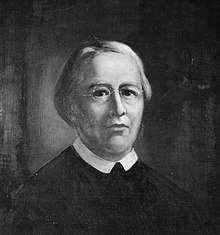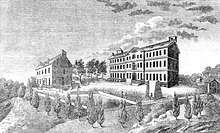William Feiner
William Feiner (born Wilhelm Feiner; December 27, 1792 – June 9, 1829) was a German Catholic priest and Jesuit who became a missionary to the United States and eventually the president of Georgetown College. Born in Münster, he taught in Jesuit schools in the Holy Roman Empire and Galicia as a young member of the Society of Jesus. He then emigrated to the United States following the restoration of the Society, and took up pastoral work and teaching of theology in Conewago, Pennsylvania before becoming a full-time professor at Georgetown College. There, he also became the second dedicated librarian of Georgetown's library, and ministered to the congregation at Holy Trinity Church. Eventually, Feiner became president of the university in 1826. Despite becoming the leader of an American university, he never mastered the English language. Long plagued by poor health due to tuberculosis, his short-lived presidency came to an end after three years, just weeks before his death.
William Feiner | |
|---|---|
 Portrait of William Feiner | |
| 13th President of Georgetown College | |
| In office 1826–1829 | |
| Preceded by | Stephen L. Dubuisson |
| Succeeded by | John W. Beschter |
| Personal details | |
| Born | Wilhelm Feiner December 27, 1792 Münster, Prince-Bishopric of Münster |
| Died | June 9, 1829 (aged 36) Georgetown, District of Columbia, U.S.[lower-alpha 1] |
| Resting place | Jesuit Community Cemetery |
Early life
Wilhelm Feiner[2] was born on December 27, 1792, in the city of Münster.[3] He entered the Society of Jesus on July 12, 1808, in White Russia[4] (i.e. Belarus),[5] officially becoming a member on August 7 of that year.[6] Before emigrating to the United States, he taught in Jesuit schools in the Holy Roman Empire and Galicia.[3][7] For this reason, he was sometimes erroneously identified as being Polish, rather than German.[3]
American missionary
He was sent to the United States in 1822,[8] in order to assist the American Jesuits re-establish their work following the worldwide restoration of the Society of Jesus in 1814.[9] After his move, he anglicized his name as William Feiner.[3] From 1823 to 1826, he was assigned to the parish at Conewago in Adams County, Pennsylvania,[10] as an assistant to Matthew Lekue.[11] This was likely due to his fluency in the German language and the large German-speaking population in Conewago.[12] In addition to his pastoral work, Feiner also taught theology in Conewago in 1824.[13] Peter Kenney, the Jesuit visitor to the United States, returned to Europe, and appointed Feiner to the position in his stead; by this time, Feiner was already in very poor health.[14]
He was made the prefect of studies at Georgetown College from 1825 to 1826,[15] as well as a professor of theology and German.[16] James A. Neill took over as prefect of studies at the end of his term.[17] In 1825, he became the second official librarian of the Georgetown University Library, after Thomas C. Levins, who had filled the position since 1824, was dismissed from the Society of Jesus and left for New York City. When Feiner relinquished the office the following year, James Van de Velde succeeded him.[18]
Georgetown College

When the president of Georgetown College, Stephen Larigaudelle Dubuisson, was permitted to resign the office, he eagerly set sail for Europe,[19] and Feiner was appointed president May 4, 1826,[4] by the Jesuit provincial superior, Francis Dzierozynski. He assumed the office on July 8, 1826,[20] despite suffering from advanced tuberculosis and being unable to speak even basic English;[21] indeed, Feiner never mastered the English language.[22] When Feiner learned of the provincial's order, he is said to have entered Dubuisson's room sobbing and declaring that he was neither competent to hold the office nor desired it.[21] While president, he simultaneously ministered to the congregation at Holy Trinity Church in Georgetown.[8]
While president, Feiner was also a professor of moral theology in 1828 and of dogmatic theology as well in 1829.[23] Given Feiner's failing health, John W. Beschter left for the college in anticipation of having to succeed Feiner as president.[24] Overall, his administration of the college was deemed lackluster.[25] He resigned the presidency on March 30, 1829,[26] and on June 9 of that year, he died at Georgetown College. There, he was buried in the Jesuit Community Cemetery.[3]
Notes
- Georgetown was a separately chartered city within the District of Columbia until the consolidation of the district's governments into a single entity, Washington, D.C., with the Organic Act of 1871.[1]
References
- Dodd 1909, p. 40
- Burson & Wright 2015, p. 205
- Buckley 2013, p. 130
- Kenrick 1916, p. 36
- Kruszka 1905, p. 21
- Schmid 2012, p. 135
- Burson & Wright 2015, p. 209
- Curran 1993, p. 99
- Easby-Smith 1907, pp. 64–65
- Kenrick 1916, pp. 35–36
- Woodstock Letters 1886, p. 24
- Reily 1885, p. 33
- Woodstock Letters 1886, p. 10
- Curran 2019, pp. 201–202
- Curran 1993, p. 404
- Shea 1891, p. 70
- Easby-Smith 1907, p. 63
- Drake 2003, p. 1141
- Shea 1891, p. 71
- Shea 1891, p. 73
- Buckley 2013, p. 122
- Burson & Wright 2015, p. 212
- Ryan 1904, p. 5
- Shea 1891, p. 79
- Curran 1993, p. 101
- Jackson 1878, p. 224
Sources
- Buckley, Cornelius Michael (2013). Stephen Larigaudelle Dubuisson, S.J. (1786–1864) and the Reform of the American Jesuits. Lanham, Maryland: University Press of America. ISBN 978-0-76186-232-1. Archived from the original on June 29, 2019. Retrieved June 29, 2019 – via Google Books.CS1 maint: ref=harv (link)
- Burson, Jeffrey D.; Wright, Jonathan, eds. (2015). The Jesuit Suppression in Global Context. Cambridge: Cambridge University Press. ISBN 978-1-10703-058-9. Archived from the original on February 28, 2019. Retrieved June 29, 2019 – via Google Books.CS1 maint: ref=harv (link)
- Curran, Robert Emmett (1993). The Bicentennial History of Georgetown University: From Academy to University, 1789–1889. 1. Washington, D.C.: Georgetown University Press. ISBN 978-0-87840-485-8. Archived from the original on January 15, 2019. Retrieved June 29, 2019 – via Google Books.CS1 maint: ref=harv (link)
- Curran, Robert Emmett (2019). "Peter Kenney: Twice Visitor of the Maryland Mission (1819–21, 1830–33) and Father of the First Two American Provinces". In McCoog, Thomas M. (ed.). With Eyes and Ears Open: The Role of Visitors in the Society of Jesus. Jesuit Studies. 21. Leiden: Brill. pp. 192–213. ISBN 978-90-04-39484-1. Archived from the original on June 30, 2019. Retrieved June 30, 2019 – via Google Books.CS1 maint: ref=harv (link)
- Dodd, Walter Farleigh (1909). The Government of the District of Columbia: A Study in Federal and Municipal Administration. Washington, D.C.: John Byrne & Co. p. 40. OCLC 2485653. Retrieved June 30, 2019 – via Internet Archive.CS1 maint: ref=harv (link)
- Drake, Mariam A., ed. (2003). Encyclopedia of Library and Information Science. 2 (Second ed.). New York: CRC Press. ISBN 978-0-82472-078-0. Archived from the original on June 29, 2019. Retrieved June 29, 2019 – via Google Books.CS1 maint: ref=harv (link)
- Easby-Smith, James Stanislaus (1907). Georgetown University in the District of Columbia, 1789–1907. 1. New York: Lewis Publishing Company. OCLC 633425041. Archived from the original on June 29, 2019. Retrieved June 29, 2019 – via Google Books.CS1 maint: ref=harv (link)
- Jackson, Richard Plummer (1878). The Chronicles of Georgetown, D.C., from 1751–1878. Washington, D.C.: R. O. Polkinhorn. p. 224. OCLC 51514617. Retrieved June 29, 2019 – via Internet Archive.CS1 maint: ref=harv (link)
- Kenrick, Francis Patrick (1916). Diary and Visitation Record of the Rt. Rev. Francis Patrick Kenrick. Lancaster, Pennsylvania: Wickersham Printing Co. p. 35. OCLC 223334154. Retrieved June 29, 2019 – via Internet Archive.CS1 maint: ref=harv (link)
- Kruszka, X. Wacław (1905). Historya Polska w Ameryce [History of Poland in America] (PDF) (in Polish). 1. Milwaukee, Wisconsin: Spółka Wydawnicza Kuryera. OCLC 830348789. Archived (PDF) from the original on June 30, 2017. Retrieved June 29, 2019 – via Polish-American Liturgical Center.CS1 maint: ref=harv (link)
- "Newtown Manor". Woodstock Letters. XV (1): 7–33. March 1, 1886. Archived from the original on June 29, 2019. Retrieved June 29, 2019 – via Jesuit Online Library.
- Reily, John Timon (1885). Conewago: A Collection of Catholic Local History. Martinsburg, West Virginia: Herald Print. p. 33. OCLC 16390452. Retrieved June 30, 2019 – via Internet Archive.CS1 maint: ref=harv (link)
- Ryan, John J. (May 1, 1904). "Our Scholasticate—An Account of Its Growth and History to the Opening of Woodstock, 1805–1869: Part II". Woodstock Letters. XXXIII (1). Archived from the original on January 30, 2019. Retrieved June 29, 2019 – via Jesuit Online Library.CS1 maint: ref=harv (link)
- Schmid, Johanna (2012). "German Jesuits in Maryland and Pennsylvania 1740–1833" [Historical Archive of the Society of Jesus]. Archivum Historicum Societatis Iesu. LXXXI: 125–157. Retrieved June 29, 2019 – via Internet Archive.CS1 maint: ref=harv (link)
- Shea, John Gilmary (1891). "Chapter XIV: Father William Feiner, S.J.". Memorial of the First Century of Georgetown College, D. C.: Comprising a History of Georgetown University. 3. Washington, D.C.: P. F. Collier. pp. 73–78. OCLC 960066298. Archived from the original on June 29, 2019. Retrieved June 29, 2019 – via Google Books.CS1 maint: ref=harv (link)
External links
- Gulielmus Feiner at Find a Grave
- Appearance in the records of the Georgetown Slavery Archive
| Academic offices | ||
|---|---|---|
| Preceded by Stephen Larigaudelle Dubuisson |
13th President of Georgetown College 1826–1829 |
Succeeded by John W. Beschter |